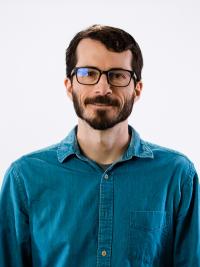Research Spotlight: Andrew Bishop


Each month, the Communications Team reaches out to members of the Department of English faculty and graduate program and asks them to elaborate on a current research or creative project they are working on or have recently completed. For this month, we asked graduate student Andrew Bishop about his research on the economic and cultural history of leisure in the US.
In your own words, as the expert that you are, can you explain the overview of your project?
My dissertation explores the industrial-era crystallization of leisure in its modern form—clearly defined, regularly recurring and commercially exploitable periods of “free time”—and the development of a new middle-class method of valorizing and justifying leisure. This new method, which I claim the US middle class appropriated from the aristocracy, involved the ideal of culture, the notion that the work of cultivating our innate, God-given capacities is the purpose of leisure and indeed of life more generally. I argue that this new take on the Protestant work ethic had, unlike the original and more conservative Protestant work ethic, anti-capitalist potential; it laid the groundwork for the kind of rigorous critique of the industrial capitalist division of labor that we find in the writings of Henry Thoreau and Karl Marx. However, in the first part of my dissertation, I demonstrate how William Ellery Channing and the other mid-19th-century liberal promoters of the importance of culture conceptualized the most decisive means of culture in such a way that the spread of culture did not require economic critique or reform but instead could become a kind of substitute for economic reform, siphoning off energy that could have been invested in altering the organization of production and redirecting that energy into efforts to improve the realm of consumption. In the second part of my project, I look at the fate of the cultural ideal in the modernist era, when the dominant stance with respect to culture changed: increasingly, many members of the middle class wanted to protect rather than spread culture, and this new exclusionary impetus led to new conceptions of cultural capital that we can find in the novels of Ernest Hemingway and Willa Cather.
Now, could you shorten this description into one sentence that uses accessible language?
I’m interested in the nature, anti-capitalist potential, and conservative fate of a certain reaction to the rise of industrial capitalism: a reaction that, in the US, took the form of lots of mid-19th-century, middle-class talk about the importance of all members of society being afforded the opportunity to achieve their wholeness by cultivating their innate forms of potential, regardless of their class position.
In what ways is your research significant?
One of the most important elements of my research is the way, as I alluded to above, it reveals how cultural reform could and should have taken a different form in the US. Efforts to share access to culture with the working classes should have been tethered to radical economic reform, since (in my view) only through economic change can culture be what mid-19th-century liberals mistakenly claimed that it already was: a universally realizable ideal that is consistent with democracy. But instead cultural reform was decoupled from economic reform—and I think the results were catastrophic. To be sure, we ended up with lots of sites that many Americans, including myself, value and enjoy: public parks, concerts, libraries, museums and other forms of non-commercial (or less commercial) entertainment. But we didn’t end up with a redistribution of the material resources that are necessary for making cultural pursuits substantial or primary parts of our lives, something other than just after-work hobbies. From a materialist perspective, cultural reform was totally inadequate, even inhibiting. And I think realizing its inadequacies, its wasted potential, yields a more nuanced and critical view of the aforementioned forms of culture (parks, museums, etc.) that were produced and sacralized in the industrial era and that continue to be produced and sacralized today.
Are you working with any colleagues or collaborators?
I’ve benefited immensely from lots of conversations with my advisor, Elizabeth Hewitt, and from the other members of my dissertation committee, Jesse Schotter and Jared Gardner.
Is the project being funded or supported by any individuals or organizations that you would like us to acknowledge?
No current sources of funding that I need to mention—although I’m certainly grateful for the University of Texas at El Paso for taking me on this fall as a visiting assistant professor and giving me the opportunity to continue teaching and researching.
Where do you see this project going in the future?
I’ve been saying for a long time that I want to write about Rebecca Harding Davis. In novels like Margret Howth (1862) and her groundbreaking short story about the growing industrial proletariat, “Life in the Iron Mills” (1861), she is refreshingly irreverent and blunt when it comes to the new cultural imperative. She consistently calls attention to the material preconditions for achieving and manifesting culture, taste, refinement and everything else that the American middle class was beginning to value. And she rejects the cultural imperative in part on these grounds. I think she is crucial to my research—not least because she reveals that what I’m calling the new gospel of culture was indeed, for the middle class, a new gospel and one that, throughout much of the 19th century, remained contentious. The gospel had potential religious and political implications (e.g., it suggested the possibility of a working-class rebellion) that many Americans like Davis recognized and feared.
What's next for you? What would you like to work on once this project is completed?
I’m still so invested in this project that, for better or worse, I struggle to think much about what is next. However, I began graduate school as an ecocritic writing about representations of nature in US literature. Given our rapidly unfolding environmental crisis (or crises), I’d like to find a way to more explicitly blend my interests in environmental theory and history with the economic and cultural history of leisure in the US. One way would be to focus on an issue that remains somewhat tangential in the latest iteration of my dissertation: the question as to what constitutes, from an environmental perspective, an ethically legitimate system for producing and distributing leisure (or freedom). So many Western freedoms, as I’m hardly the first to note, are carbon-intensive. I’d like to use literature and theory to think about some less carbon-intensive pleasures.
